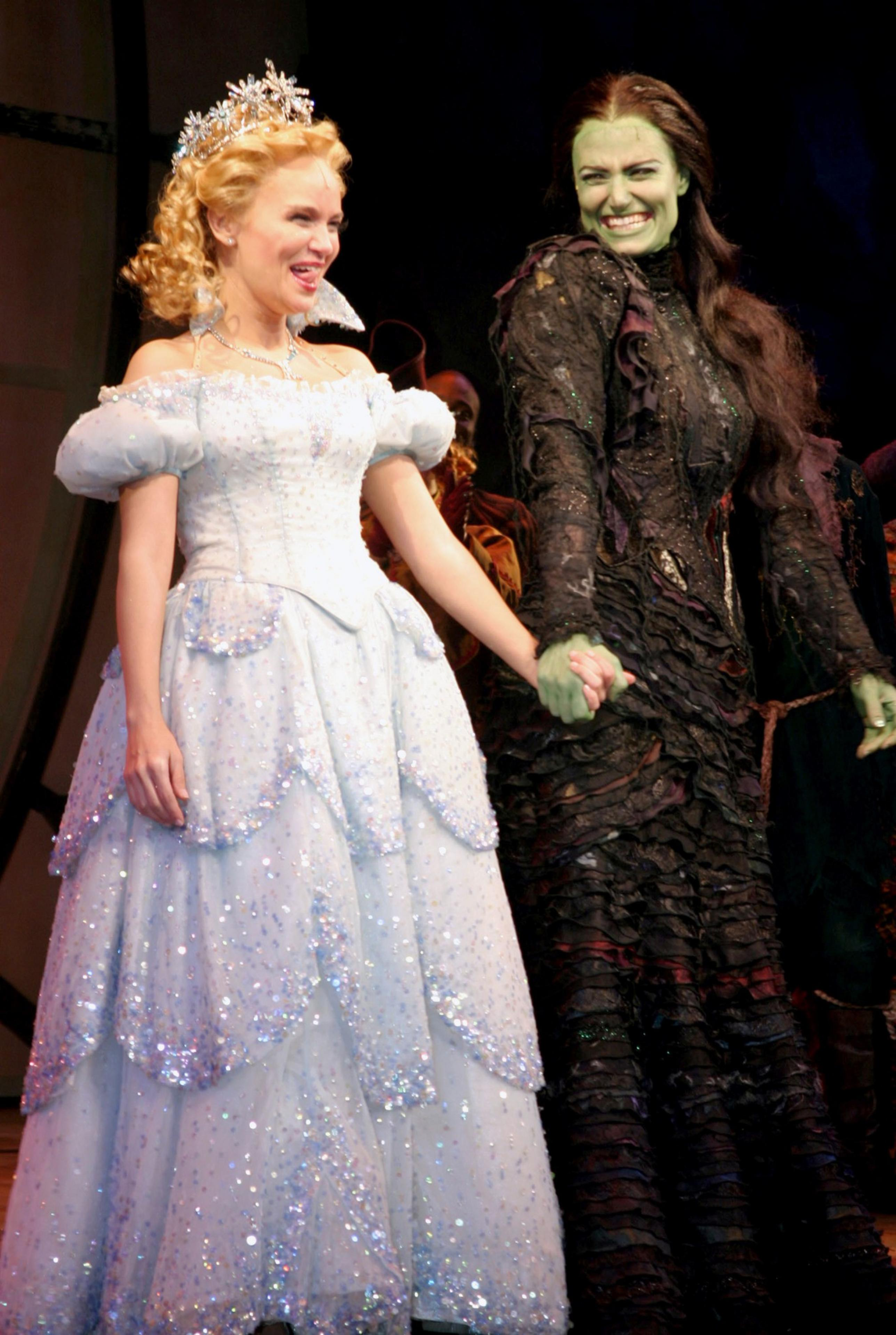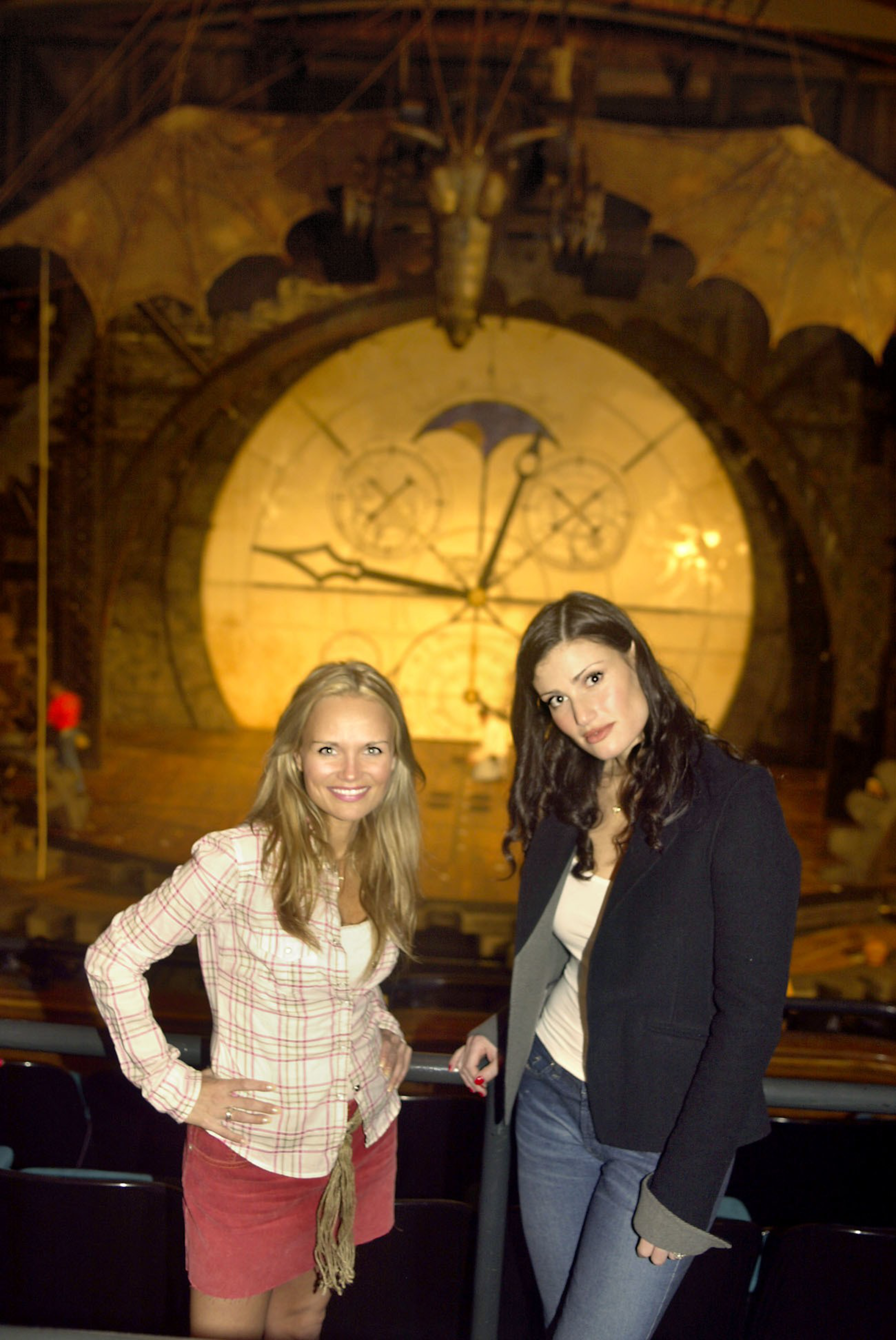The creative team was at war. The reviews were mixed. Audiences were elated, then sleepy. A few walked out.
Two decades before it was a starry movie adaptation, “Wicked,” which hits screens this weekend, was an unpolished stage musical being ironed out in front of San Francisco audiences. They helped shape the final product with their laughs, sighs, cheers — and occasional boredom.
The musical opened in May 2003 at the Curran Theatre with its iconic original cast, starring Idina Menzel and Kristin Chenoweth, before moving to Broadway that fall. The producers chose the Curran for an out-of-town tryout — in part because they knew that San Francisco audiences would give it to them straight. And true to their expectations, the musical was not immediately popular.
“It was … very long,” said Char Dubinsky, a self-proclaimed “huge theater geek” who saw the fourth-ever performance of “Wicked,” when the show had a running time of more than three hours. “They definitely needed to edit.”
The musical, Dubinsky remembers, clearly had potential. She did not anticipate that it would run for two decades on Broadway, becoming one of the highest-grossing productions of all time.
Walter von Tagen III drove from Santa Cruz to see “Wicked” that summer. His first reaction: “Well, it’s not ‘Camelot’ with Richard Burton.” Still, he liked the show’s message of empowerment and the way it played with L. Frank Baum’s original “Oz” characters.
The Examiner gave it a rave (opens in new tab), but the Chronicle wrote (opens in new tab) that “the yellow road has a few bricks missing,” and Variety excoriated (opens in new tab) the “gluey, banal sentiment.”

Still, San Francisco theatergoers mostly celebrated “Wicked.” They arrived at the first performance wearing witch hats and leapt to their feet at the end to give the actors a standing ovation, David Cote noted in the 2005 book “Wicked: The Grimmerie, a Behind-the-Scenes Look at the Hit Broadway Musical.”
“I remember the awe from everyone in the audience, no matter what the age,” said Katie Mitchell, a publicist for the show who was present on opening night. “Wicked” went on to sell out its San Francisco run. In 21-year-old footage from the Curran, Chenoweth’s Glinda is seen descending in a mechanical bubble, asking teasingly, “It’s good to see me, isn’t it?” An audience member shouts, “Yes!”
“Wicked,” based on the 1995 novel by Gregory Maguire, imagines a backstory for the witches in “The Wonderful Wizard of Oz” and Baum’s other books in the series. The musical is a flashy spectacle, a love letter to female friendship, and a parable about the rise of fascism. Its iconic songs, among them “Popular,” “For Good,” and “Defying Gravity,” remain pleasantly inescapable at funerals, retirement parties, and talent shows, as well as on TikTok (opens in new tab).
For fans, seeing “Wicked” onstage is close to a sacred experience. The sight of Elphaba rising toward the theater rafters on a broomstick is not just an impressive technical feat (she’s standing on a cherry picker obscured by yards of black fabric) but a visceral message that power is more potent when it derives from a place of authenticity.
This version of authenticity has become enduringly profitable: “Wicked” has followed the yellow brick road to more than $5 billion in earnings (opens in new tab), and the movie is projected (opens in new tab) to bring in more than $100 million at the box office on opening weekend.
In San Francisco, the show’s creators altered “Wicked” in response to audience tastes. Producers and stars stayed at the Clift hotel next door to the Curran — at least until composer-lyricist Stephen Schwartz decamped for the Hotel Nikko around the corner to get some personal space, according to his biographer Carol de Giere.
The team reworked the show constantly. The script was changing so quickly that Menzel stood in the wings at the Curran reviewing her new lines on Post-It notes before rushing back onstage.
“To the outside eye, the tweaks we made in San Francisco probably look minor,” director Joe Mantello told Cote. “To us, they were enormous.”
Schwartz told de Giere that a week after opening night, he sat down with local newspaper reviews and emails from audience members, looking for consensus on what needed to change to make “Wicked” great.
Both the Mercury News and the Oakland Tribune mocked a major musical number, so Schwartz scrapped it and replaced it with a new song, “Dancing Through Life.” The audience at the Curran responded so warmly to Chenoweth’s comedic Glinda that the writers spent the weeks after the San Francisco run working out funnier, more likable moments for Menzel’s Elphaba.
Audiences ate it up: The line at the ticket booth stretched around Geary Street. Menzel told Cote that her mother would linger in the bathroom at the Curran during intermission and report back on the number of women who were dabbing their eyes after the Act One showstopper “Defying Gravity.”
Still, things were tense: De Giere writes that the creative team had showdowns over the storyline, issued ultimatums, and occasionally screamed at one another. Chenoweth and scriptwriter Winnie Holzman stress-shopped at the Union Square Macy’s between shows.
At the end of the San Francisco run, Schwartz explained to producer Marc Platt that if “Wicked” opened on Broadway without changes from the San Francisco version, “you have the legal right to do that, in which case, you’ll never see me again.”
“Who can say if I’ve been changed for the better?” Glinda and Elphaba sing in the musical’s second act. Schwartz got his way — he and Holzman spent weeks rewriting before the Broadway opening, and the show did change for the better. When “Wicked” returned to San Francisco in 2009, Schwartz said (opens in new tab), it was like “coming home.”
San Francisco, he noted, “was very, very good to us.”
